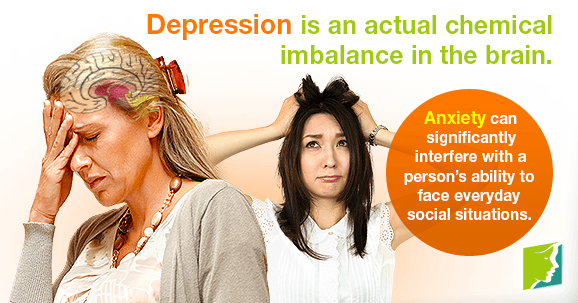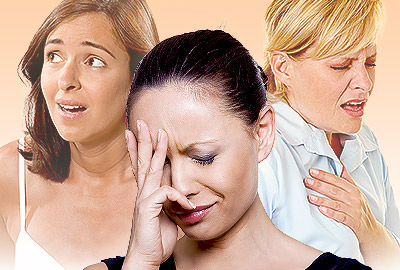Anxiety and depression are among the most common mental health disorders, affecting millions of Americans every day. It is important to understand exactly what these illnesses are and how to effectively treat them. Anxiety is defined as a psychological state that is characterized by the exaggerated, persistent feelings of worry, tension, and nervousness. Depression is described as a serious mental illness that is characterized by constant, overwhelming feelings of sadness, and hopelessness. Although anxiety and depression share many of the same symptoms, they are two entirely different diseases.
Anxiety
There are several types of anxiety disorders, including social phobia, generalized anxiety disorder, post-traumatic stress disorder, obsessive-compulsive disorder, and panic disorder. Causes of anxiety disorders can range from hormone fluctuations and stress to genetics, medication side effects, and previous emotional trauma.
Symptoms of anxiety can be divided into physical and psychological. Physical symptoms can include sweating, dizziness, increased heart rate, shortness of breath, muscle tension, insomnia, and headaches. Psychological symptoms typically consist of feelings of dread, intense fear, restlessness, and irritability.
Depression
Researchers think that depression is most likely caused by a combination of genetic, biological, environmental, and psychological factors. Brain imaging technologies have shown that the brains of people suffering from depression look different than those without depression. The parts of the brain involved in mood, thinking, sleep, appetite, and behavior appear different; however, they are still unsure of why this is.
Symptoms of depression can also be categorized into physical and emotional. Physical symptoms of depression are fatigue, insomnia, increased or decreased appetite, body aches, cramps, and headaches. Emotional symptoms include thoughts of suicide, irritability, loss of interest in activities, and feelings of helplessness, guilt, and worry.
The Difference
While anxiety and depression are both mental illnesses that share similar symptoms, they are completely different conditions. It is not fair to compare the two since they are so different, but generally speaking, depression is typically more severe and is a common cause of suicide in the United States. Depression is an actual chemical imbalance in the brain, while anxiety is generally a different way of thinking. That is not to say that anxiety is not a severe mental condition - it can significantly interfere with a person's ability to face everyday social situations and maintain relationships.
Treatment Options
While making lifestyle changes like exercising and eating healthy can help ease some anxiety and depression symptoms, getting professional help is strongly recommended. Anxiety and depression are psychological conditions and should be treated as such. Talking to a therapist, being properly diagnosed by a doctor, and trying prescription medication can help treat anxiety and depression.
Anxiety and depression are serious mental conditions that can severely affect your daily life. It is crucial to seek proper treatment if you feel you are suffering from either of these illnesses. Anxiety is characterized as the persistent, intense feelings of worry and tension. On the other hand, depression is defined as the constant and overwhelming feelings of sadness, emptiness, and apathy. Therapy and prescription medication are viable treatment options for anxiety and depression.
Sources
- National Institute of Mental Health. (n.d.). Anxiety Disorders. Retrieved September 29, 2014, from http://www.nimh.nih.gov/health/publications/anxiety-disorders/index.shtml
- National Institute of Mental Health. (n.d.). What is Depression? Retrieved September 29, 2014, from https://www.nimh.nih.gov/health/topics/depression/index.shtml
- Office on Women's Health. (2012). Anxiety Disorders Fact Sheet. Retrieved September 29, 2014, from http://www.womenshealth.gov/publications/our-publications/fact-sheet/anxiety-disorders.html




